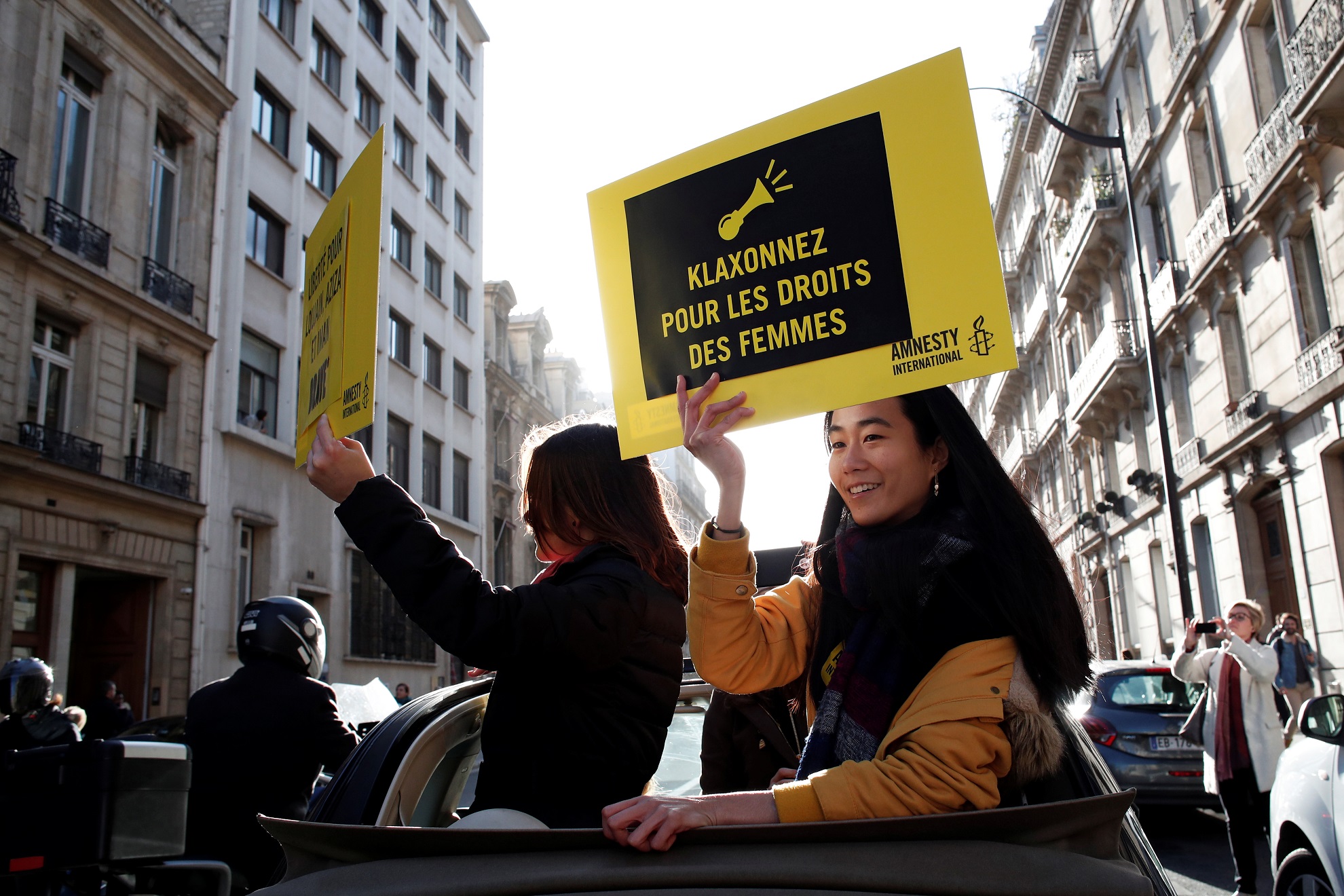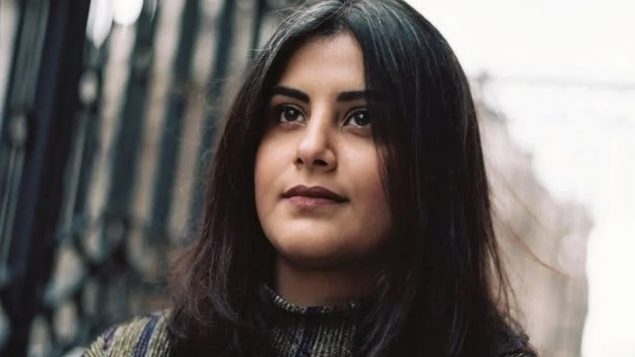Loujain al-Hathloul, whose fight for human rights–especially women’s rights–touched hearts around the world, appears to have emerged triumphant–for now– from a Saudi prison after a long battle with authorities who kept her behind bars but never managed to break her spirit.
After nearly three years in the kingdom’s Ha’er Prison, where she told her family she had been held in solitary confinement and subjected to electrocution, flogging and sexual assault, al-Hathloul, a 31-year-old graduate of the University of British Columbia, was released on parole by Saudi authorities on Wednesday.
Her sister Lina tweeted the news.
The @LoujainHathloul at home after 1001 days in prison pic.twitter.com/SIm274rAEw
— Lina Alhathloul لينا الهذلول (@LinaAlhathloul) February 10, 2021
“The best day of my life, Loujain is at my parent’s home,” al-Hathloul’s elder sister, Alia, tweeted.
“Loujain is out. Loujain is free!” wrote her brother Walid, who lives in Toronto.
But with the family’s joy, came warnings from human rights groups, including Amnesty International, who said al-Hathloul still faces a five-year-travel ban and three years of probation that forbids her from any political activity.
“We want to make sure that it’s clear that she has been released from prison but she is not free. Loujain is still waiting for the result of her appeal and she still a convicted terrorist in Saudi Arabia solely for her peaceful activism,” Amnesty spokesperson Jacqueline Hansen said Wednesday.

Al-Hathloul, a determined advocate for women’s rights in Saudi Arabia, is pictured Wednesday morning during a video chat with her sister Lina, who confirmed her release from a Saudi prison where she had been held for nearly three years. Al-Hathloul still faces a five-year travel ban, which human rights groups still makes her vulnerable to arrest. (Lina al-Hathloul)
“We remain concerned. The kingdom has not sent any signal that it is going to welcome activism in support of women’s rights in the future.”
Amnesty’s view was echoed by Abdullah Alaoudh, Gulf research director at Democracy for the Arab World Now.
“If she is not allowed to leave Saudi Arabia, or is forced to remain on probation, there is no reason to believe she will not be arrested again or forced to remain subject to her country’s draconian laws that prevent her from speaking out and demanding her basic rights,” Alaoudh said.
The United Nations welcomed al-Hathloul’s release, but delivered a warning: “It is important that others who are in the same condition as her, who have been jailed for the same reasons as her, also be released and that charges be dropped against them,” U.N. spokesman Stephane Dujarric said.

Al-Hathloul’s determination through her ordeal drew support from human rights groups and everyday people around the word. (Loujain al-Hhathloul/Facebook)
Al-Hathoul first caught international attention in 2014 for trying to win the right to drive for Saudi woman.
She was detained for 73 days after she attempted to live stream herself driving from neighbouring United Arab Emirates into Saudi Arabia as she pushed for an end to Saudi Arabia’s restrictive male guardianship system that limited women’s freedom of movement.
A photo made from a video became an iconic image seen around the world.

In this Nov. 30, 2014 image made from video released by Loujain al-Hathloul, al-Hathloul drives towards the United Arab Emirates – Saudi Arabia border before her arrest the following day in Saudi Arabia. (Loujain al-Hathloul via AP, File)
A year later she ran as a candidate in the first election in the kingdom’s history that permitted woman candidates.
In May 2018, she was arrested with at least nine other women-rights activists in a crackdown by Saudi authorities.
The activists were branded as “traitors” in pro-government newspapers just weeks before the kingdom lifted the world’s only ban on women driving.
As the pressure on the women grew, her friends and professors at the University of British Columbia feared for al-Hathloul’s health and safety.

Al-Hathloul graduated from the University of British Columbia in 2014 with a degree in French. (Facebook)
Throughout her imprisonment–as she awaited trial in solitary confinement trial and faced torture–al-Hathloul refused to knuckle under–going on hunger strikes multiple times as the COVID-19 pandemic indefinitely delayed her trial.
And, despite sometimes failing health, she remained resolute and determined through her ordeal.
When–in August of 2019–she was offered her freedom if she would make a video clearing her torturers, she refused.
And, when there were times when her family lost touch at with her, she persevered.

Prior to her arrest and detention, al-Hathloul was known for her vivacity and spirit as well for her determination. (Loujain al-Hathloul/Facebook)
Last December, she was sentenced to nearly six years in prison by Saudi Arabia’s anti-terrorism court–a sentence Global Affairs Canada called “deeply troubling.”
The court suspended two years and 10 months of the sentence, most of which she had already served, and following a concerted campaign by her family and human rights groups, al-Hathloul was granted probation by a judge in Riyadh and was released to her family on Wednesday.
If al-Hathloul persevered–remaining determined and resolute–so did human rights organizations around the world, especially Amnesty International, which kept the heat on Saudi authorities by backing demonstrations and refusing to just go away quietly.

Al-Hathloul and her husband, Fahad Albutairi, are seen in an undated photo. (Instagram)
On Wednesday, Amnesty released a statement:
“Loujain al-Hathloul’s release after a harrowing ordeal in prison in Saudi Arabia–lasting nearly three years–is an incredible relief, but long overdue” the statement reads.
“Nothing can make up for the cruel treatment she has suffered, nor the injustice of her imprisonment. During her time in prison she was tortured and sexually harassed, held in solitary confinement and was denied access to her family for months at a time. Saudi Arabia’s authorities must ensure those responsible for her torture and other ill-treatment are brought to justice. They must also ensure she is not subjected to any further punitive measures such as a travel ban.

Demonstrators from Amnesty International hold placards outside the Saudi Arabian Embassy to protest on International Women’s day to urge Saudi authorities to release jailed women’s rights activists Loujain al-Hathloul, Eman al-Nafjan and Aziza al-Yousef in Paris, France, March 8, 2019. The placard reads: “Honk for women’s rights”. (REUTERS/Benoit Tessier)
“Loujain al-Hathloul should never have been forced to spend a single second behind bars. She has been vindictively punished for bravely defending women’s rights in Saudi Arabia, and for exercising her right to freedom of expression.”
With files from CBC News (







For reasons beyond our control, and for an undetermined period of time, our comment section is now closed. However, our social networks remain open to your contributions.